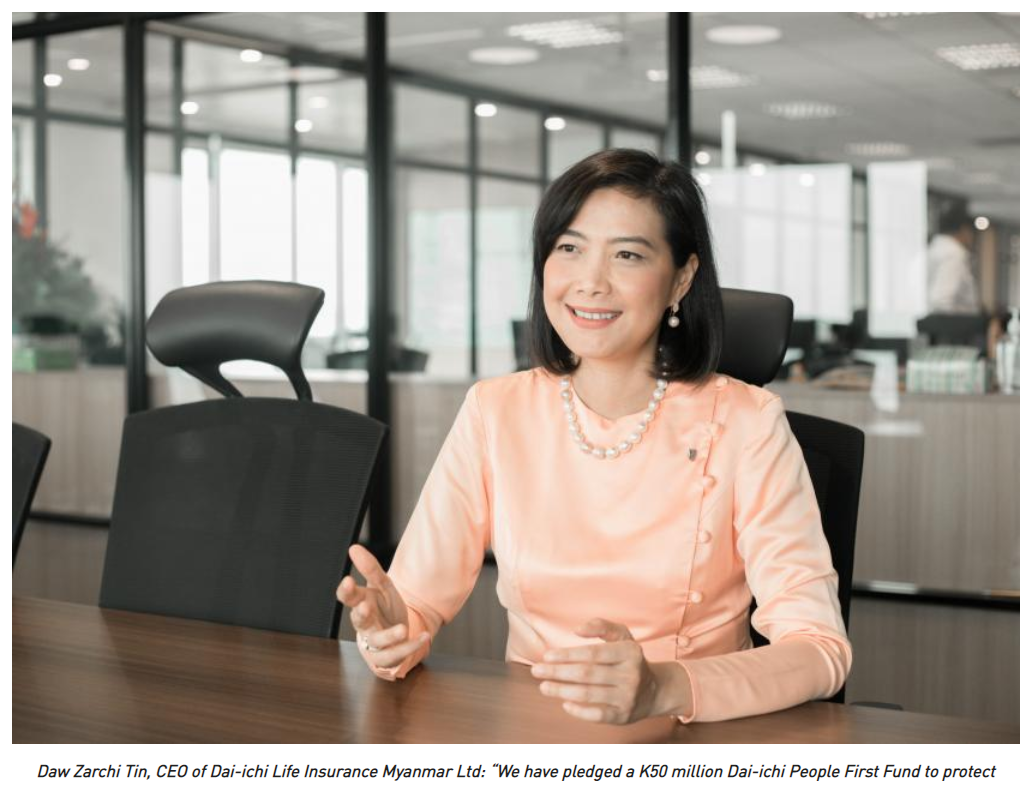Myanmar: Dai-ichi Life taking long-term view of challenges to industry
Life insurance providers in Myanmar are upping their game, spurred by the gradual rise of COVID-19 cases in the country.
“At the moment, people are more aware of their personal health and are asking if their health and life insurance policies cover COVID-19,” said U Thaung Han, secretary of the Myanmar Insurance Association.
In response, a growing number of providers have started offering insurance policies against the virus to retain customers and draw new ones. “It is not a government order. The local and foreign insurers are just responding to the needs and demands of their customers,” he said.
While a setback for Myanmar’s insurance providers in the short term, the coronavirus pandemic presents an opportunity to raise interest and expand market share in the long term.
Among the companies offering coverage for COVID-19, Dai-ichi Life Insurance Myanmar Ltd was one of the first. The 117-year-old Japanese company was among the first five foreign-owned providers to receive a licence from the Myanmar government last November.
Licences were also awarded to Prudential Myanmar Insurance, AIA Myanmar, Chubb Life Myanmar and Manulife Myanmar, permitting these companies to compete on a level playing field with local insurance providers.
“As a result of COVID-19, we have pledged a K50 million Dai-ichi People First Fund to protect policyholders against COVID-19,” said Daw Zarchi Tin, CEO of Dai-ichi Life Myanmar.
For the company, it’s a chance to further cement a long-term expansion strategy to protect the health, incomes and long-term savings of young families. “These are segments that have a clearly defined need for life insurance protection,” Daw Zarchi Tin said.
Dai-ichi Life isn’t the only insurance provider keeping active during the pandemic. Other local and foreign insurers like KBZ MS Insurance, CB Life Insurance, Capital Taiyo Life Insurance, GGI Nippon Life Insurance, and Prudential have all launched life and health policies covering COVID-19 to stay competitive in the past two months.
Rising competition
There is growing competition in the Myanmar insurance sector, which has been regarded by the industry as one of the last growth markets in the region.
Before COVID-19, providers would often team up with local businesses and influencers to generate consumer awareness. Dai-ichi Life, for example, appointed mixed martial arts champion Aung La N Sang as its brand ambassador, while Prudential cemented a partnership with fitness booking app Flexible Pass to promote healthy living.
Before the pandemic, Dai-ichi Life was seeing more interest in life and health insurance among married couples and young families.
“That’s very much to do with where they are in their stage of life, some with young children and some planning to have kids. They tend to look at future planning more, and they are more inclined to think about social safety nets,” she said.
Interest in health insurance had also picked up, particularly among middle to upper class people aged 25 and above. “Young people were getting more concerned about their health and wanted to get the best medical attention in the event of a major illness as their incomes grew.”
Distribution strategy
But with COVID-19 dealing a blow to the industry’s ability to market its products to consumers, each firm’s distribution strategy is now vital to establishing a strong presence and growing their market share in Myanmar.
“Our future growth will depend on our agents, so we will be investing a lot of time in them. As an immediate and traditional distribution channel, we will start working with banks to distribute our products through bancassurance partnerships,” Daw Zarchi Tin said.
On March 4, the Insurance Business Regulatory Board permitted insurance providers to form such partnerships. It also permitted agents to sell insurance, subject to obtaining the necessary licences. Any new insurance products must be approved before launch.
“We expect these channels to be developed quite rapidly given the healthy competition to meet market demand,” she said.
The other companies have certainly wasted no time. Prudential has signed a partnership with Yoma Bank to offer savings and life protection policies at the bank’s branches across the country.
Manulife and UAB have signed a memorandum of understanding for Manulife to offer life insurance products to bank customers. AIA is working with AYA Financial Group, and GGI is working with the Myanmar Apex Bank on similar bancassurance deals, The Myanmar Times understands.
According to research by KBZ MS, the bancassurance sector in Myanmar could grow to K2 trillion (US$1.3 billion) if applied to the total projected insurance market in Myanmar by 2029.
But all these tie-ups are pending approval by the Financial Regulatory Department. And with COVID-19 having changed the way business is being conducted in Myanmar, insurers must find new and innovative ways to raise public demand for their products.
Daw Zarchi Tin isn’t worried though. “The entry of foreign life insurers is creating awareness and curiosity among the Myanmar population, helping to accelerate education and awareness of life insurance. It’s creating pent-up demand. With keen competition, insurance awareness will be much increased, and we expect it to pick up more.”
She said Dai-ichi Life’s investment in Myanmar will outlast the COVID-19 pandemic. “Dai-ichi always takes a long-term view of the business in every market. We have been around for over 117 years. We have the expertise to ensure that we will be here for many generations to come,” she said.
Source: https://www.mmtimes.com/news/dai-ichi-life-taking-long-term-view-challenges-industry.html


 English
English




